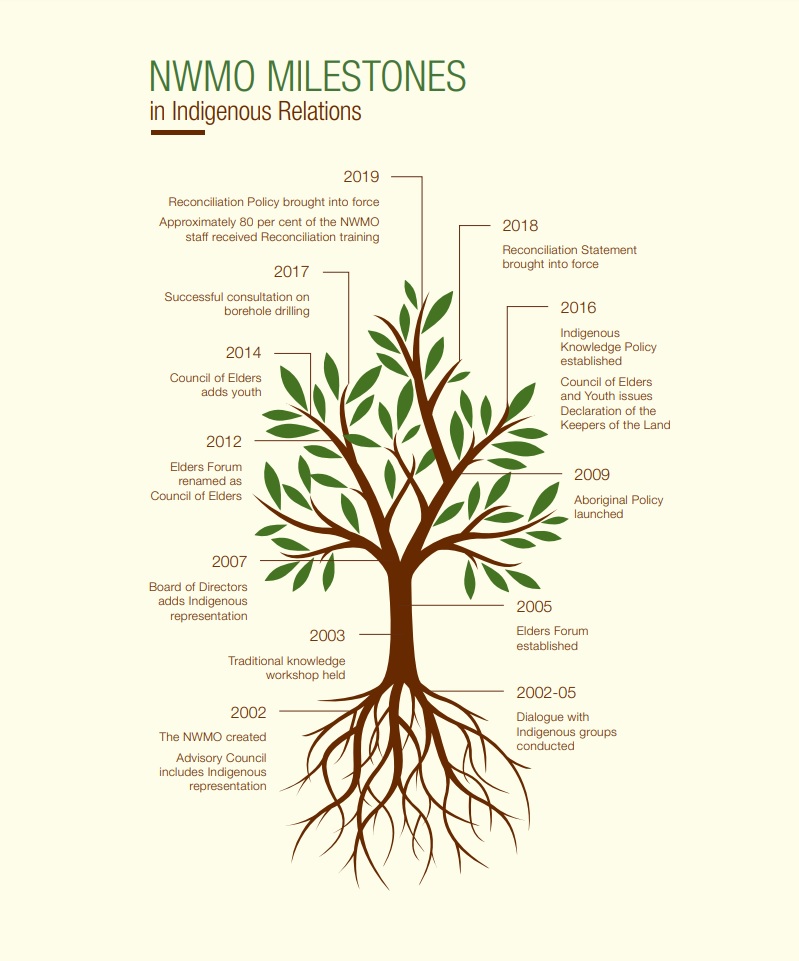Indigenous engagement
Overview
A Memorandum of Understanding between Natural Resources Canada and the NWMO was signed on Aug. 14, 2009. It clarifies the roles and responsibilities of each party with respect to any obligation for consultations with Indigenous peoples.
Indigenous relations milestones

Public information material in Indigenous languages
Memorandum of Understanding (2009)
A Memorandum of Understanding (MOU) between Natural Resources Canada (NRCan) and the NWMO was signed on August 14, 2009. It clarifies the roles and responsibilities of the Crown, as represented by the Minister of Natural Resources, and the NWMO with respect to consultations with Indigenous communities, pursuant to the Government’s duty to consult, and accommodate if necessary, and the NWMO’s statutory obligations under the
Nuclear Fuel Waste Act (NFWA). The MOU covers the period of our work that precedes the identification of a site to host the project.
Our Obligations Under the NFWA
The NWMO is obliged under the NFWA to consult with Canadians and Indigenous communities throughout the implementation of Adaptive Phased Management (APM). We are also required to report to the Minister of Natural Resources every year on the results of our public consultations.
Our Obligations Under the MOU
The NWMO is responsible for:
- Continuing to work with Aboriginal peoples regarding our work prior to the identification of a site for the project;
- Informing Aboriginal peoples during engagement activities that we will keep the Crown informed on our engagement activities;
- Submitting to NRCan, by March 31 of each year, a report outlining our engagement activities with Aboriginal peoples for the previous year and an overview of our proposed activities for the upcoming year, as well as records supporting our activities related to Aboriginal engagement;
- Providing regular briefings to the NRCan on our engagement activities;
- Maintaining a record of the engagement activities we carry out in relation to Aboriginal peoples prior to the identification of a site for the project;
- Advising the Crown in a timely fashion of any concerns raised by Aboriginal peoples that appear to be beyond the project and our scope and responsibility; and
- Providing the Crown with notice of communities that formally express interest in hosting the project (after the site selection process has been initiated) in a timely fashion.
The Crown's Obligations Under the MOU
Through NRCan the Crown is responsible for:
- Monitoring engagement activities we carried out in relation to Aboriginal peoples;
- Assessing the need for consultations that may be necessary to meet the Crown's duty to consult;
- Seeking assistance from other appropriate Government entities as required; and
- Keeping us informed of any interactions the Crown may have with Aboriginal peoples in relation to our work.
The Government has a legal duty to consult with Aboriginal peoples and accommodate, if required, when an Aboriginal treaty or right may be adversely affected by conduct contemplated by the Government.
The Crown will monitor, review and provide feedback, if required, on our engagement activities with Aboriginal peoples throughout the implementation of the APM approach. Under the MOU, we will submit to NRCan, by March 31 of each year, a report outlining our engagement activities with Aboriginal peoples for the previous year and an overview of our proposed activities for the upcoming year, as well as records supporting our activities related to Aboriginal engagement. We will also provide regular briefings to NRCan on our engagement activities.
Resources:
Submissions from Indigenous organizations
Over the years, a number of Indigenous and Métis organizations have gotten involved in learning about Canada's long-term plan for the safe management of used nuclear fuel. In some cases, they have taken part in learning activities. Some groups have undertaken special studies and developed tool kits to help inform various aspects of the project. These are available below.
Resources:
- A Framework for Action - National Youth Council - AFN
- Finding Your Voice: Environmental Toolkit for Aboriginal Women
- Assembly of First Nations Report on "Alternative Exposure Groups, Characteristics and Data for the Post-Closure Safety Assessment of a Deep Geological Repository"
- Assembly of First Nations Nuclear Waste Management Traditional Decision-Making Consensus Building - Draft Tool Kit
- Assembly of First Nations Seven Generations Report
- Our Mother, The Earth: the Role of Aboriginal Women in Environmental Issues and Challenges
- Federation of Saskatchewan Indian Nations Year End Report 2012-2013
- Year-End Report 2011-2012 Information Sessions Regarding NWMO
- Report on Information Workshop on First Nations and Nuclear Waste Disposal - FSIN Project Status Report
- Métis Nation of Ontario - Annual General Assembly Report
- Implementing the Plan for the Long-Term Management of Canada's Used Nuclear Fuel - Meeting Report
Additional documents and reports
- Project to Explore Two-Way Communication with Aboriginal Peoples
- Developing Effective Two-Way Communications Between Canada's Aboriginal Community and the NWMO
- Innovative Approaches to Natural Resource Management
- Project to Develop Awareness and Understanding of NWMO and Adaptive Phased Management with Aboriginal Peoples
